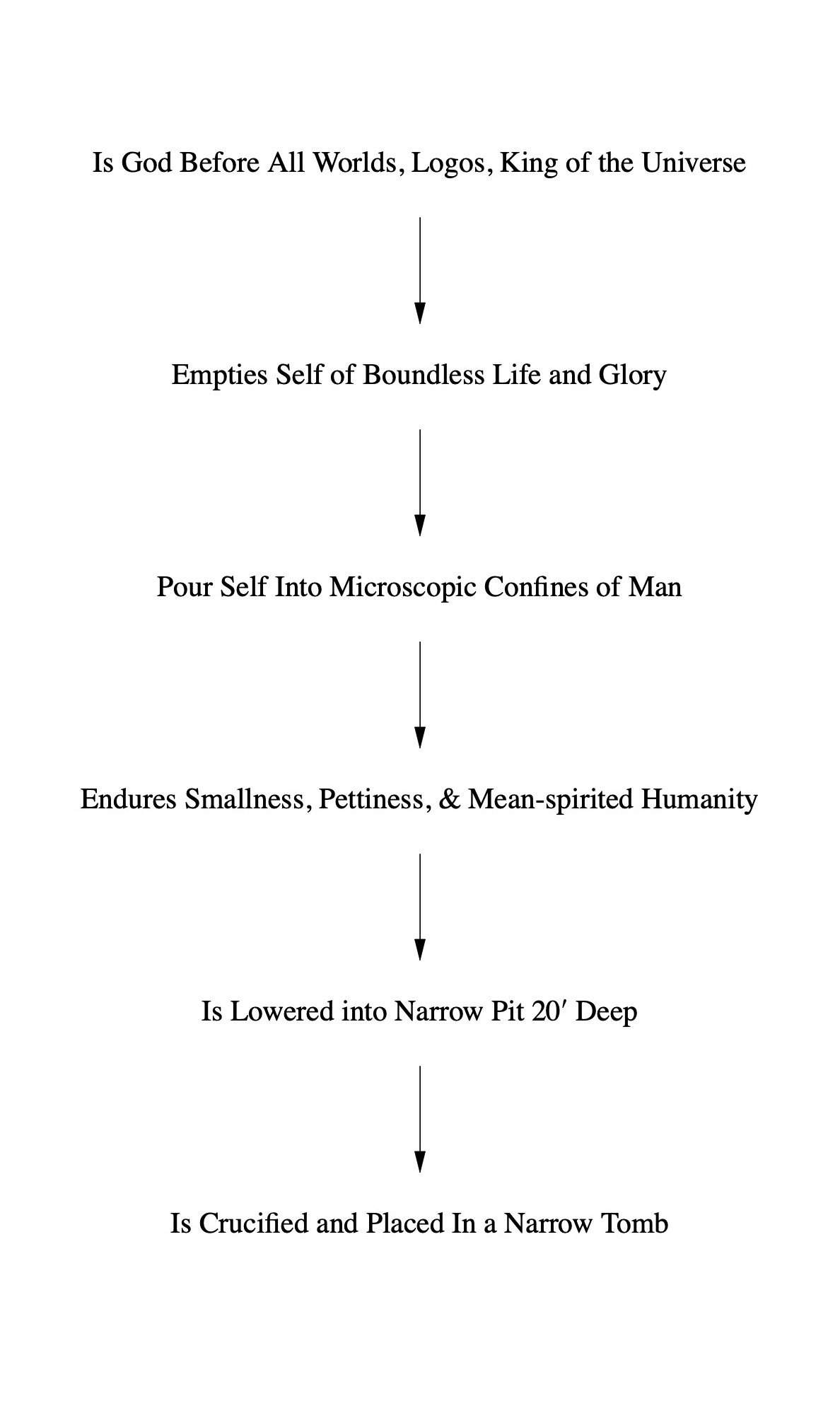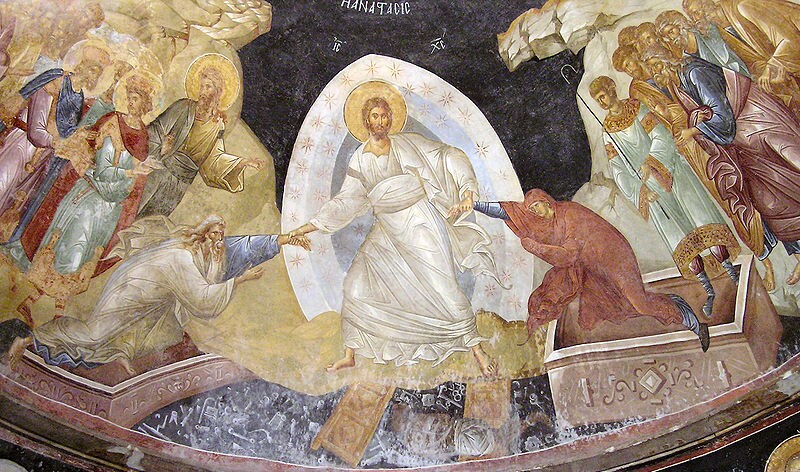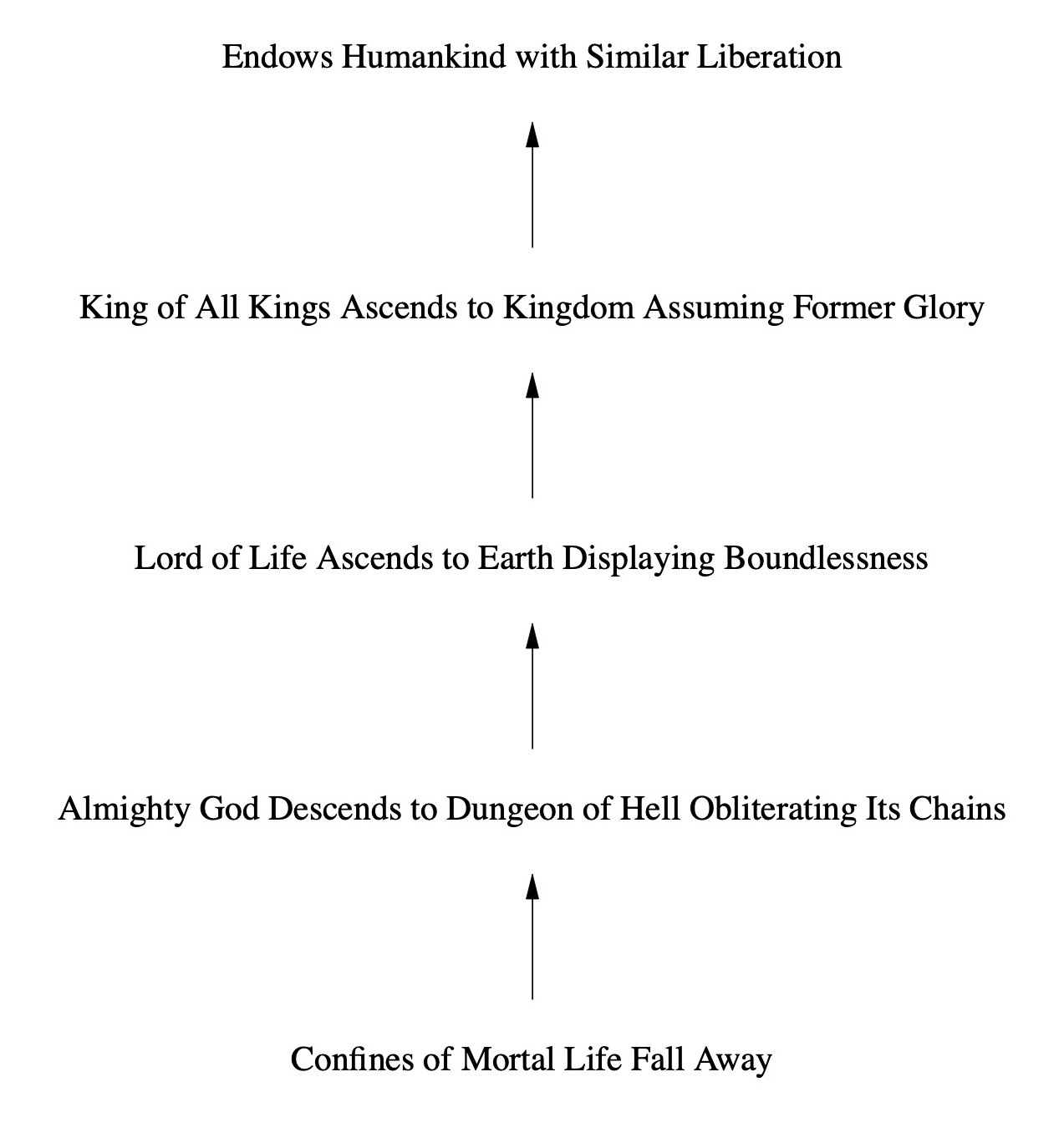

The Lord Christ, the Mighty God, has burst our earthly bonds. He has shaken the earth off of us who were buried and freed us from clay of this world. And He has annihilated another bond, a bond held by Satan, whose title is "Death."
Before the Incarnation of Christ, the telos, the blueprint, the destiny lying within each human life was the same: Hades (in Hebrew, Sheol). It did not matter what your moral (or immoral) choices and deeds might have been. Hades was the abode of all.
It was a place of darkness, denoting evil — a place utterly divorced from the Kingdom of Heaven. For no path had been blazed from earth to Heaven, a highway that would be open to all and was open to all in the days of Eden.
We say it is a place, for the Witch of Endor was able to summon the spirit of Samuel from its precincts at the behest of King Saul. In later developments, Hades is said to have compartments separating the evil from the virtuous.
For all of that, its main distinguishing feature was not the Kingdom of God. For only Adam and Eve once held that high hope: to be constant companions with God and His angels. Instead, the only communion with angels that remained for humankind would be with fallen angels whose career after Heaven would be as earthbound creatures. (As we discussed earlier today, fallen angels included those who had become fascinated with earthy things.) Perhaps in this we grasp the connection between earthiness and evil.
We may well imagine the alarm experienced by the demons of Hades at the appearance of God's Own Son:
|
And suddenly they cried out, saying, "What have we to do with You, Jesus,
You Son of God? Have You come here to torment us before the time?" (Mt 8:29) |
This is interesting, for we learn that a time when God would intervene in the world had already been appointed.
We can also well imagine that this general alarm reverberated down through caverns of Hades. Certainly, this new situation was known to Satan, who tempted God's Son in the wilderness.
So now set before all, Hades was a great riddle devised for the demonic mind. The intervention of God, it seems, has begun has begun. It had begun before the appointed time. And the Almighty has not appeared with the Heavenly host armed for battle as it had been before. Instead, He has appeared in the form of a weak and vulnerable man. What could this mean?
The other humans, it seems, have killed Him, killed their God! So the riddle would go to new depths and complexities, perhaps signifying new risks. (What you don't know is always risky.) So where shall the God-man now go now? The demons had been clear all along that He was indeed God. They had fallen down before Him worshipfully (Mk 3:11). What was not so clear was the status of the man. What could this human nature signify. Will He return to the Kingdom of God? Or shall He now enter the House of Death ..... surely, He had really and truly died. How could the hosts of Hell decipher this enigma? For, you see, there was no precedent.
But a decision point was to come sooner than later. The Son of God offered Himself to Satan. He said, "I will pay the ransom for your prisoners with My Own Person. If you will release the virtuous captives of Hell, I shall willingly enter to stand in their former place." Hearing this, the Devil hastily leapt at the bargain. "The Prince? The Heir? The Alpha and Omega and Logos? The Only-begotten Son of God .... is mine?" And so the gaping maw of Hell opened greedily to swallow the Creator of the universe.
You see, the lying mind cannot grasp ultimate realities. Long and orderly thoughts, discipline persistence of memory, is not the mind developed by a lying person. A lying person is not a person of principles but of situations. "Well, I am in this situation, so I will say that. Now, I am that situation, so I will say this." Do you see? There is order, no coherence. The lying mind cannot grasp principles and ultimate realities.
The self-absorbed ego cannot see the wide world. He can only see himself .... and those ancillary to this center of all.
The fixed stare of greed or lust or gluttony cannot see past the morsel now in view.
And for these reasons, and no doubt many more, the finitude of Hell attempted to bind infinity, the Mighty God, in its iron chains. Immediately, a quaking was felt moving the ground beneath the feet of those standing on Calvary hill. (I have seen the deep fissure in rock beneath where the Holy Cross had stood.) The hinges of Hell were blown off their door posts. The high doors of Hell shattered in the sight of all. And the Lord Jesus took the goodly captives by the hand and "didst lead them to the light," as the ancient Liturgy would say. "He didst set the limit" defining the new boundaries of Afterlife.
|
"The Son of Man did not come to be served, but to serve,
and to give His life a ransom for many." (Mt 20:28) |
I wonder if we can grasp the scope and scale of this ransom, which (as we just read) He located as the purpose of His life among us.
Let us consider this in the fullness of its scale and scope. He departs from boundless Heaven to be confined within the minuscule limits of a man. During His Passion, He is lowered into a narrow and lightless pit, twenty feet deep, near to the high priest's courtyard. Following His execution, He is laid in a narrow tomb, newly hewn from rock. But this narrowing and narrowing and narrowing, reaching the limits of indignity and abuse, finally comes to the breaking point. And He burst His earthy bonds. He shattered His human prison-house at His death.
We might say that, in this, He has effected a similar liberation for all human creatures, but that liberation had already happened at His birth, when the Creator touched the Creation with His Own Person, releasing a shockwave so profound that it flipped the telos in every human person from death to life (St. Athanasius, De Incarnatione).
It would be the Resurrection which would manifest to the unbeliever what was already true. What was the most effective feature of Jesus' preaching in Hell (1 Pet 3:18-20)? His having risen from dead! But the believer would have surmised this all along. Did He not raise Lazarus from the dead? Did He not raise Jairus' daughter from the dead? Was He not manifestly the Lord of all life?
Yes, the high doors of Hell were blown off their iron hinges freeing the virtuous who have been interred in the bowels of the earth. The stone of His tomb was rolled back. And His boundless Kingdom of Heaven, which had already drawn near, descends in power — the infinite now descending into the finite.
And now, receiving this precious birthright, we who were born into Resurrection light, what is our way ahead? He had modeled The Way in His life, and, yes, on the Holy Cross: as He had said, servanthood and to be a ransom for others (cf. Damon and Pythias). This is the highest kind of love, recognized by the Greeks, by the Romans, and by the Lord of all: "No greater love hath any man than this."
His thirty-year interment in flesh had set the scene: self-sacrifice, lowliness, self-denial to its very core, and the noblest act of human love, which is to lay one's life down for one's friends.
Do you notice the funneling down in His self-subtraction from God to human:


So many of us remain in earthy bonds. So many have enslaved their minds and souls to the baubles of this world. The philosopher-emperor, Caesar Marcus Aurelius, marveled that so many men and women could comport themselves like beasts, gladly trading away their innate nobility in exchange for some brief moments of animal pleasure.
The prison-house of desire is an iron confinement that even our loving God cannot redeem. We read in Metropolitan Hilarion Alfeyev's meditation of Jesus Descent into Hades that Jesus did not lead a single soul out of Hades. He did not lead a single soul into the Kingdom of Heaven. Jesus made the gift of this liberation to all. (St. John of Damascus wrote, "But not all could receive it.")
It is up to each one of us to grasp its importance and receive it into our hearts binding it to our souls with hoops of steel, Shakespeare would say. All He can do is wait .... wait for us to take hold of ourselves and begin the journey along the golden road to Heaven.
He speaks to us still. Will those of us who go to Hell hear His preaching? We have heard it all our lives! And it is written upon the fleshly tablets of our hearts: one cherished phrase and sentence after another. He speaks to us still of our destination and our home.
|
"In my Father's house are many mansions: if it were not so,
would have told you. I go to prepare a place for you." (Jn 14:2) |
For each of us,
for each and every one of us,
He has prepared a place.
In the Name of the Father and of the Son and of the Holy Ghost. Amen.